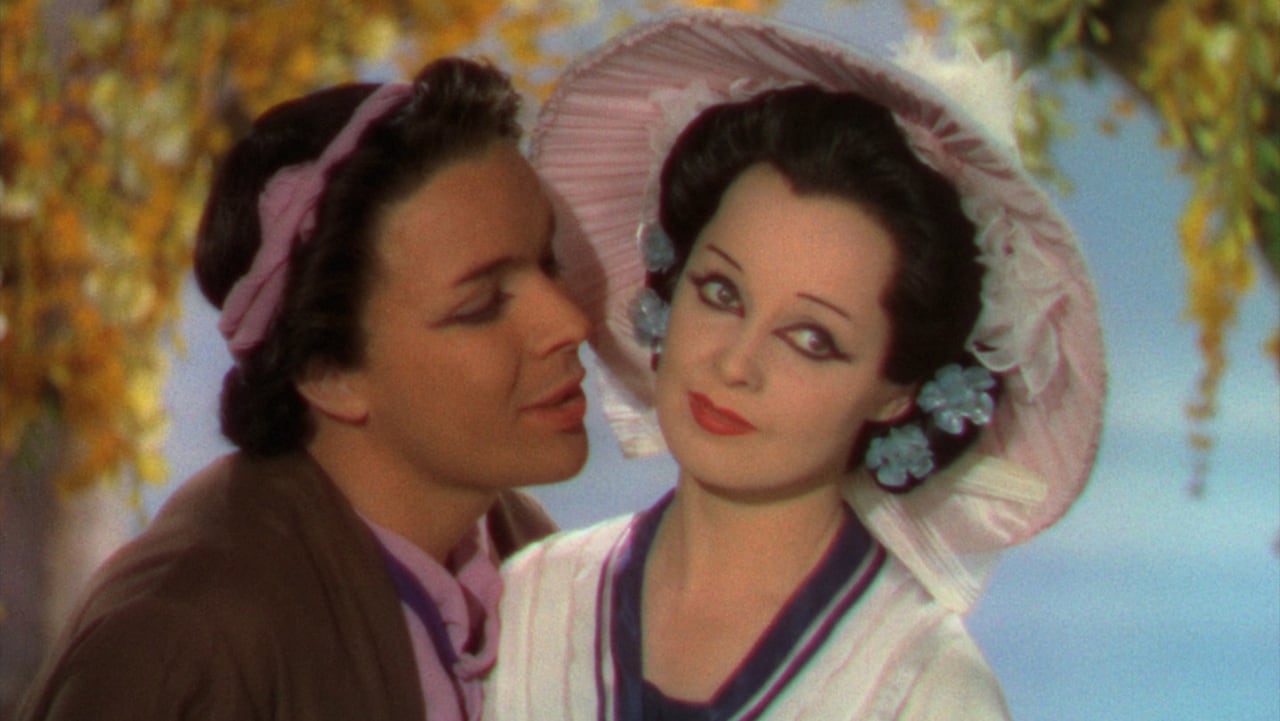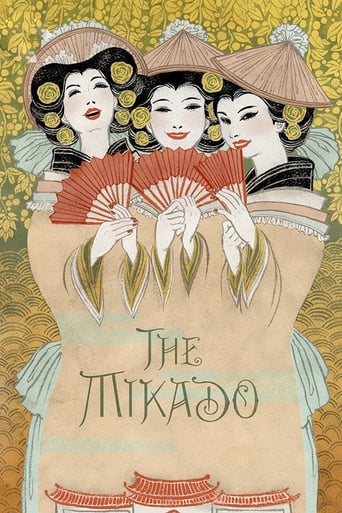JohnHowardReid
Associate producer: Josef Somlo. Producer: Geoffrey Toye. This film was produced by arrangement with Rupert D'Oyly Carte. Made at London's Pinewood Studios.Music played by the London Symphony Orchestra conducted by Geoffrey Toye. Chorus from the D'Oyly Carte Opera Company. Songs, all lyrics by Sir William Schwenck Gilbert, music by Sir Arthur Seymour Sullivan: "The Sun, Whose Rays" (Baker, reprized Colin), "Gentlemen of Japan" (chorus), "A Wandering Minstrel, I" (Baker and chorus), "Our Great Mikado" (Stroud and chorus), "Behold the Lord High Executioner" (chorus), "Taken from a County Jail" (Green), "Comes a Train of Little Ladies" (chorus), "Three Little Maids from School" (Colin, Paynter, Naylor and chorus), "Were You Not to Ko-Ko Plighted" (Baker and Colin), "I Am So Proud" (Granville, Green, Stroud), "With Aspect Stern" (Green, Granville, Stroud, chorus), "The Threatened Cloud Has Passed Away" (Baker, Colin, Granville, Paynter, Naylor, chorus), "Long Life to Nanki-Poo" (Granville, chorus), "Your Revels Cease!" (Willis, chorus, Paynter, Baker), "Braid the Raven Hair" (chorus), "For He's Going To Marry Yum-Yum" (Paynter and chorus), "Brightly Dawns Our Wedding Day" (Colin, Paynter, Baker, Stroud), "Here's a How-De-Do!" (Colin, Baker, Green), "Miya Sama" (chorus), "Obedience I Expect" (Barclay, Willis, chorus), "A More Humane Mikado" (Barclay and chorus), "The Criminal Cried" (Green, Paynter, Granville, chorus), "The Flowers That Bloom in the Spring" (Baker, Green, Colin, Paynter, Granville), "Titwillow" (Green). Deleted songs: "Young Man Despair", "I've Got a Little List", "So Pardon Us'', "Oh Fool", "Flutter Little Heart", "A Is Happy", "Alone And Yet Alive", "Beauty in the Bellow of the Blast", "For He's Gone and Married Yum-Yum". Copyright 10 May 1939 by Universal Pictures Co., Inc. A G&S Films (London) Production. New York opening at the Rivoli: 1 June 1939. U.S. release: 8 September 1939. U.K. release through General Film Distributors: January 1939. Australian release through G-B-D/20th Century-Fox: 15 June 1939. 11 reels. 91 minutes. SYNOPSIS: Rather than marry his father's choice, the son of the Mikado of Japan flees from the palace. NOTES: Universal's first full Technicolor release. COMMENT: Exquisite. Mind you, some viewers complained that Kenny Baker's American accent was distracting. Others were unhappy by the omission of Ko-Ko's famous patter song about his "little list". And many of the songs that are retained have been cut down to a few verses. But who could resist such a charmingly pastel-colored production, brilliantly enacted and sung, and so stylishly presented? Sound recording and other technical credits are superb.
Frumious_Bandersnatch_46
I REALLY wish I could give this production 4½ stars. I find that I didn't really like it -- but I didn't really DISlike it, either.At the start, I was SURE that this movie had been "colorized". I checked the date, I checked my screen, I checked the date, I checked my screen. Then I restarted the opening credits and saw it was, indeed, filmed in color -- in 1939.Yes, they cut "I Have a Little List" and a couple of other favorites. And, yes, they chopped quite a lot out of "My Object All Sublime" -- among others. And yes, they switched the order of some them.However, I think today's audiences would prefer the emended "Little List" and "Sublime" to Gilbert & Sullivan's original lyrics. I think this version was filmed BEFORE the "official" amendments to those songs -- to eliminate the N-word.I agree with the reviewer who said that this production is better seen as a visual record of the D'Oyly Carte Opera Company than as excellence in transferring a stage production to film. Now I'm off to find another version to watch. 2011/09/28.
didi-5
This version of 'The Mikado' was released in 1939 and was an early Technicolor production. This, and the fact that most of the cast are D'Oyly Carte veterans and experts in the material, means it is extremely watchable today. Even the addition of American Kenny Baker as Nanki-Poo (who acquits himself very well in such exalted company) can't spoil the feeling of watching a superior piece of operetta.Of course there are a number of songs missing from this score, which is a shame. Chief amongst these is Ko-Ko's 'Little List', which I think was cut because of contemporary references which could seem offensive today. If that's true, it is a pity to lose such a show-stopper. I'd also liked to have seen more of Pooh-Bah, who has two songs deleted.If you like Gilbert and Sullivan, or operettas generally, or big stage production musicals, sung well and acted with style, 'The Mikado' is for you.
bkoganbing
With the exception of American radio tenor Kenny Baker, the members of the D'Oyly Carte Opera Company are the cast of this filmed production of the Mikado. It was the first technicolor film done in the United Kingdom although in that same year, much better use of color was made in The Four Feathers.A lot of history has passed since The Mikado made its debut in the 1880s. At that time Japan was considered the most exotic place on earth and with good reason. In 1853, the American expedition under Commodore Matthew Perry forcibly opened Japan to the world. Up to that time they had almost completely isolated themselves from the west for over 200 years. Westerners who found there way there, never returned. Only the Dutch had extremely limited trading facilities in Japan for years.When they did open up, the curiosity of the west was unbounded on both sides of the Atlantic pond. In time the British would sign a treaty of alliance to protect each other's Far East interests. When that treaty was not renewed in 1923 it eventually set the two powers on a course for war.But in the 1880s Great Britain was fascinated by things Japanese and Gilbert&Sullivan scored a big old satirical hit with The Mikado. If the music and manners of the cast sound British it's because from the safety of a land during the Middle Ages, the battling partners could get a few barbs in about British society and politics from a very firm safety net. The way Pooh-Bah collects offices and honors with the accompanying salaries was very much in line with the way the British courts over the years rewarded service rendered.Starring in the role of Nanki-Poo the Mikado's son who has run away because he doesn't want to marry some old harpy dad's picked out for him is American radio singer Kenny Baker. He did several films, most notably the Goldwyn Follies where George Gershwin's last song hit during his lifetime, Love Walked In, became permanently identified with him. Baker was a regular on Jack Benny's radio program, later replaced by Dennis Day. Later on Baker scored a big hit on Broadway with Mary Martin in One Touch Of Venus. No doubt for reasons of export the British producers chose Baker to have some recognizable name away from the D'Oyly Carte regular company who no one on this side of the pond would have known. Baker's light pleasing tenor does justice to the Gilbert&Sullivan patter.The film does lack production values though, it's a photographed performance of the opera. I would have liked to have seen better and outdoor sets possibly, but this is a never-neverland kind of Japan.The Mikado got an Oscar nomination for color cinematography, but was just another casualty to the Gone With The Wind juggernaut of 1939. Still it's an interesting film and Gilbert&Sullivan fans who just care about the music should be pleased.

